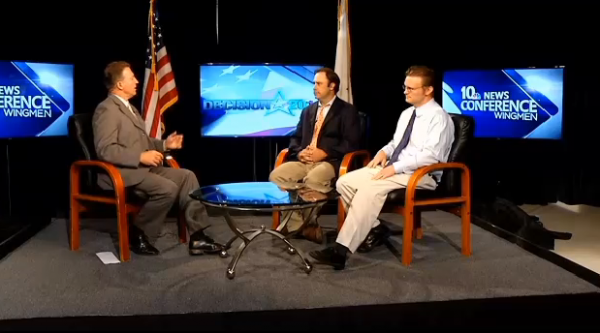 by Amanda Clarke and Melanie Carrazzo
by Amanda Clarke and Melanie Carrazzo
The RI NOW Political Action Committee (RI NOW PAC) announced their endorsements in anticipation of the state primary elections on September, 13 2016.
The RI NOW PAC is excited to have so many candidates committed to improving the lives of women within the state of Rhode Island. Endorsed candidates have pledged their support on the issues of reproductive freedom, economic equality, ending violence against women, constitutional equality, civil rights for all, affirmative action and moving women out of poverty through empowering, non-punitive welfare policies.
“Currently women hold only 31 out of 113 seats in the RI General Assembly. The RI NOW PAC has endorsed 18 women so far in this election and we are thrilled to throw our support behind these candidates to increase gender parity in the General Assembly,” said Amanda Clarke, Chair of the RI NOW PAC. “We are also pleased so many men are willing to stand with women and fight for policy change to improve social and economic conditions for women in Rhode Island.”
The complete list of RI NOW PAC endorsements is as follows:
Rhode Island State Senate
- Gayle Goldin, Senate District 3
- Jonathan Hernandez, Senate District 6
- Doris De Los Santos, Senate District 7
- Matthew Fecteau, Senate District 8
- James Seveny, Senate District 11
- Dennis Lavallee, Senate District 17
- Margaux Morisseau, Senate District 21
- Stephen Archambault, Senate District 22
- Jeanine Calkin, Senate District 30
Rhode Island House of Representatives
- Edith Ajello, House District 1
- Christopher Blazejewski, House District 2
- Moira Walsh, House District 3
- Aaron Regunberg, House District 4
- Marcia Ranglin-Vassell, House District 5
- Anastasia Williams, House District 9
- Joseph Almeida, House District 12
- Lisa Scorpio, House District 13
- Art Handy, House District 18
- Joseph McNamara, House District 19
- David Bennett, House District 20
- Eileen Naughton, House District 21
- Jennifer Siciliano, House District 22
- Julie Casimiro, House District 31
- Carol Hagan McEntee, House District 33
- Teresa Tanzi, House District 34
- Kathleen Fogarty, House District 35
- Larry Valencia, House District 39
- William Deware, House District 54
- David Norton, House District 60
- Katherine Kazarian, House District 63
- Jason Knight, House District 67
- Susan Donovan, House District 69
- Linda Finn, House District 72
- Deborah Ruggiero, House District 74
- Lauren Carson, House District 75
Local Races
- Sandra Cano, Pawtucket City Council, At-Large
- Meghan Kallman, Pawtucket City Council, Ward 5
- Suzy Alba, Smithfield Town Council
- Jeremy Rix, Warwick City Council, Ward 2
- Elena Vasquez, Pawtucket School Committee
*Amanda Clarke is the RI NOW PAC Chair, Melanie Carrazzo is a member of the RI NOW PAC Board
]]> As the landscapes of media and communication continue to evolve, the lines between news, opinion and entertainment are blurring quicker than society can vet facts. Thus, there seems to be confusion over what is unsafe and what is uncomfortable. While the two concepts are not mutually exclusive, it is imperative to understand that neither are they the same.
As the landscapes of media and communication continue to evolve, the lines between news, opinion and entertainment are blurring quicker than society can vet facts. Thus, there seems to be confusion over what is unsafe and what is uncomfortable. While the two concepts are not mutually exclusive, it is imperative to understand that neither are they the same.
While the two concepts are not mutually exclusive, it is imperative to understand that neither are they the same.
Politics and (some) Violence
In the United States, politics was established as the means by which problems can be addressed without violence. This places faith in a system, regulated by layers of redundancy in its checks and balances, to decide what measures to pursue that reflect the vox populi. One can guess that when the founders were composing the fundamental document to establish our government, they were still reeling from the echoing concussions of revolution. These men did not feel safe.
Rather, the founders probably felt correspondingly unsafe with the prospect of a disproportionate amount of power allocated to either the central government or the state governments. They felt unsafe with the potential uprising of a population of people who were kept as property based on their race. They felt unsafe due to the enormous financial debt incurred by the colonies for the economic costs of war. So, they designed such constitutional measures as separation of powers, the second amendment to the Bill of Rights, and a fractional reserve system of banking. What worked to preserve their safety at the time was, perhaps, shortsighted.
Two-hundred-thirty or so years later, our nation, devised in liberty and dedicated to the proposition that all men are created equal, has risen to a peak in global prowess that demonstrates the success of the system born of revolution, as well as showcasing its many flaws. History shows us that, when diplomacy fails and compromise is not pursued, violence fills the vacuum. While the argument can be made for the causes of political breakdowns to be many and complex, the most notable of them have been over race, war, and money.
Last Place Aversion in (presidential) Politics
The social phenomenon happening today has been increasing in frenetic urgency every four years, showing itself in the form of presidential campaign rhetoric. Fears are stoked and false equivalencies are pedaled. Now, as the locomotive of the Republican Convention barrels into the station as if driven by Casey Jones, the strategy has become clear. Donald Trump has tapped into the ugly effectiveness of the last place aversion paradox. Last place aversion is, to put it in extremely simplistic terms, the concept of relinquishing power to those with more, if it means preserving that power from those who have less. Following Donald’s speech, now more than ever, for Democrats to win this election against the nativist, hyper-nationalist, downright racist messaging of the Republican nominee’s pro-wrestling-style cheap-pop, they must focus all their campaigns -presidential and otherwise – on civil rights. In fact, all issues must be rooted in civil rights. That is an uncomfortable truth.
Last place aversion happens when uncomfortable is confused with unsafe. Self-preservation and self destruction look alike. The rest is just dressing one’s decision with self-serving justification to make it more palatable. Often such justification is fed to people by campaigns who would have people believe that politics is something worthy only of being the butt of a joke, or effective only when threatened with the barrel of a gun. This is thinly veiled by pundits and surrogates who use the word “establishment” with negative connotation, as if when they say it they want to laugh or spit. Just as familiarity breeds contempt, so does being an outsider fill voters with a sense of honesty and purity.
The Obama Coalition, consisting in large part of the growing minority population that makes up a reliable and vocal block of voters, ready to mobilize, and for whom this election is far too important to stay home, will be organizing and voting for the Democratic nominee. That, for some, is also an uncomfortable truth.
Trump in the Garden of Good and (mostly) Evil
Donald J. Trump has campaigned by exaggerating issues that make many people uncomfortable, thereby creating the illusion they are unsafe. Race in America is an uncomfortable conversation. Immigration is an uncomfortable conversation. Terrorism and religion is an uncomfortable conversation. Yet, by harnessing the manipulative aspects of the behavioral psychological phenomenon of attribute substitution, a process thought to underlie a number of cognitive biases (including stereotypes), Trump has tipped the scale away from many of these uncomfortable conversations. If addressed bravely and honestly by Americans, perhaps communicating on these issues would make the nation a safer place in the long run. Instead, Trump scapegoats the populations statistically facing the most real danger, painting them as the causes of danger for those who are likely to harbor biases and discomfort.
Described by Daniel Kahneman in his book, Thinking, Fast and Slow, attribute substitution is best explained as:
“When faced with a difficult question, we often answer an easier one instead, usually without noticing the substitution.”
Kahneman goes on to clarify the concept:
“An easy question (How do I feel about it?) serves as an answer to a much harder question (What do I think about it?).”
Many Americans prefer not to think about “it” at all. In spite of the fact that the average (white) American is far more likely, statistically to die of heart disease than by Islamic terrorism, he is still more likely to stare suspiciously at the Middle Eastern-looking gentleman at the ballpark, while eating a second hot dog and drinking a 32 ounce Mountain Dew. That same person may complain about “Mexican illegals” taking American jobs, after leaving his empty cup and hot dog wrapper on the ground to be cleaned up by a tax paying, undocumented, Ecuadorian immigrant – a job the average (white) American would never accept. Then, he may confidently drive home, in excess of the speed limit, knowing if he gets pulled over, he will be able to afford the speeding ticket. The average (white) American takes for granted that, were he stopped, he would not be shot by the police officer.
It was to an audience, made almost exclusively of this average (white) American, to whom Trump addressed his speech, describing a thousand points of darkness. In the city in which Tamir Rice was killed for holding a toy gun, Trump talked about being the law and order candidate. Simultaneously, white nationalists and open-carry enthusiasts brandished real firearms absent of police interference. Because, the problem, according to Trump, was everyone except his audience. To call on his audience to look within themselves and discern whether or not they enjoy privilege that others lack, would make them extremely uncomfortable. The only ask he made of his audience was to vote to put him in charge and let him speak for America. Because, only he alone can solve the scourge of lawlessness which he blames on everyone except himself and his supporters. That is not only wholly illogical, it is decidedly unsafe.
(not) Voting Your Conscience
Come November, Americans will vote their individual consciences. One might argue that, based on the collective conditioning of attribute substitution and its influence on people’s cognitive biases, people who “go with their gut instinct” are just as often wrong as they are right. Yet, just as likely is that voters have already made their decisions and are simply seeking justification for the choice that makes them most comfortable. Another quote by Kahneman goes:
“We think, each of us, that we’re much more rational than we are. And we think that we make our decisions because we have good reasons to make them. Even when it’s the other way around. We believe in the reasons, because we’ve already made the decision.”
Voting one’s conscience makes one feel comfortable. Perhaps it may be better to truly weigh the facts and the potential consequences before voting.
Of course, this unsolicited advice is not directed at you. I’m certain your choice will be weighed, measured, and not be found wanting for that which is best overall for the nation’s most vulnerable and the longest and most balanced period of peace and prosperity.
Politics is not the enemy. It is the process by which America solves its problems, albeit slowly and uncomfortably, without resorting to violence.
]]> When the cache of documents related to the ongoing 38 Studios lawsuit (click here to view or download) brought by Governor Linc Chafee was released on September 24, a wealth of information was opened up. After years of curiosity, the public was able to see almost totally the chain of events that led to one of the biggest financial boondoggles in Rhode Island history.
When the cache of documents related to the ongoing 38 Studios lawsuit (click here to view or download) brought by Governor Linc Chafee was released on September 24, a wealth of information was opened up. After years of curiosity, the public was able to see almost totally the chain of events that led to one of the biggest financial boondoggles in Rhode Island history.
After years of spin, lack of comment, and problematic answers, we bring you an analysis of the sworn and true answers of the three public officials to occupy the governor’s office since the deal was struck.
DONALD CARCIERI
 After multiple days and 562 pages of deposition testimony, it is clear that former Governor Don Carcieri, the man responsible for the 38 Studios deal as chairman of the EDC, is nervous. Throughout the transcript, he peppers his answers with “you know” – a sign of anxiety.
After multiple days and 562 pages of deposition testimony, it is clear that former Governor Don Carcieri, the man responsible for the 38 Studios deal as chairman of the EDC, is nervous. Throughout the transcript, he peppers his answers with “you know” – a sign of anxiety.
When Carcieri took office in 2003, he touted himself as a pro-business reform candidate, campaigning on a promise to bring a ‘Big Audit’ to the convoluted state government. One of these moves included merging the Economic Policy Council and a smaller EDC into the single agency that approved the 38 Studios funding package. He says of the decision:
[I]t was a board decision. This was not my decision alone. I mean, this was a quasi-independent corporation. We went through lots of pains to restructure the whole corporation, created a whole new board, and as I said, I felt very pleased at the quality of the people we were able to attract, and I wanted to make sure that they could do their job.
Carcieri thought they had a prize in 38 Studios, a company that would spur the growth seen in the Cambridge, Massachusetts high-tech corridor on Route 128 decades earlier. At one point, Robert Stolzman, now a defendant in the lawsuit, wrote to the governor thanking him for involving him in the 38 Studios issue. With predicted earnings of $50 million by 2015, they believed they were going to be responsible for a high-tech renaissance.
They expected that they had a real winner in terms of a game and what they were doing in developing with a lot of industry expertise in this multi-player game was going to be very well received. They, you know, were supported in that, to my knowledge, by entertainment arts [Electronic Arts video game publishing] who understood the industry as well.
But there were warning signs from the outset that Carcieri refused to heed. One board member at the EDC, Karl Wadensten, voiced concern about the total monies being dedicated towards the project. Rosemary Gallogly, a seasoned adviser with years of experience regarding government accounting, raised multiple red flags that the governor blew off as infrastructural issues, part of the ‘big government’ he had vowed to fight.
-I don’t recall reading the whole [Strategy Analytics] report [regarding risks and possibilities]. Often they have executive summaries is what I would read, then I would skim, possibly, through, but what I’m saying to you is this is not my recollection of what was presented to the board meeting. That there was a slide dec. like all — PowerPoint or something that, you know — the sum and substance was, on balance, positive that’s my recollection, Tom.
-You’re saying your recollection on balance was positive?
-Yeah.
-Of the Strategy Analytics report was positive?
-Yes.
-Now, but you don’t know if you actually read the entire report or not, do you?
Two things become abundantly clear from Carcieri’s testimony.
First, despite boasting about his business savvy, he remained woefully out of touch with the industry he was trying to get involved in and remained so last year when deposed. Throughout the transcript, he consistently confuses the name of EA Games, the third-largest video game firm on earth, calling them ‘Entertainment Arts’ instead of Electronic Arts. When discussing the second title 38 Studios was working on at the time of their bankruptcy, a massive multi-player online game akin to the popular WORLDS OF WARCRAFT, he is hazy on the terms used in distribution, calling the industry-standard subscription-based servicing of those titles a “lease.”
That is a sign of bad business management. The Oracle of Omaha, Warren Buffett, has been very open with how he made his fortune, explaining that, if he cannot understand a prospective investment and how the company works when he sits down at his kitchen table with the spreadsheets, he passes on the investment. Buffett does not have access to the secret formula for Coca-Cola or understand how Dairy Queen produces all their dessert items, but he does understand how to drink soda and take his grandchildren out for ice cream. The trick with smart investment is understanding exactly why a product or service will have success, not due to innovation as much as appeal. In the case of 38 Studios, Curt Schilling could and probably should have done what most sports players do in retirement when they get involved with video games, release a title based on his name recognition and sports career. It may not have been as exciting as the roll-playing fantasies he hoped to develop with sci-fi author RA Salvatore, but no one has seen John Madden crying on the way to the bank. Carcieri and Schilling were both clueless about everything from basic game programming to distribution models. The former Governor was so out of touch he did not even realize that the board he was chair of had not hired IBM and Wells Fargo as consultants! That he did not know he was not the first to talk with Schilling about the venture is merely the pinnacle of his lack of connection, regardless of whether politicians like William Murphy, Gordon Fox, and others lied to him.
Carcieri also seems to have let his ideology get in the way of basic economic logic regarding recovery from a recession. Even though they portrayed themselves as conservatives, Schilling and Carcieri bear all the markings of classical English liberals in the economic sense, fiercely opposed to unions and praising the virtues of so-called ‘free markets’ and supply-side economics. They wanted to create a business boom in the tech sector, which is non-union.
Besides the aforementioned lack of industry literacy, Carcieri and other Rhode Island officials fatally misjudged why the Massachusetts Miracle happened in the first place. In that instance, technology firms since the 1960s had been creating a diverse set of products that reaped millions. And while they did see a particular boom in the 1980s and 1990s with computer software, the vast majority of the products created were technologies used in unionized jobs, such as municipal construction or lighting devices, industries with almost-guaranteed supply-and-demand ratios as opposed to video games, which are wildly uncertain in success based on the nature of customer satisfaction.
The reality is still as John Maynard Keynes told us 80 years ago, the way to get out of a recession is by having a government spend huge amounts on public works and infrastructure projects that create long-lasting, good-paying, unionized jobs. As the workers continue to take home good paychecks over the course of years, they in turn spend their earnings on everything from houses to cars to luxury services that they could not afford previously. That was the reason President Eisenhower, as a Republican, was pro-union and opposed the anti-labor ideologies of Joseph McCarthy and Barry Goldwater. He knew then that the middle class prosperity he oversaw was dependent on organized labor serving as a balance with the controlling powers of big capital. The fact Carcieri mistakenly thought that RISD could perform the same services as MIT and Harvard and that their wildly unpopular former President John Maeda would help foster this boom is the tragically ironic icing on the cake.
LINCOLN CHAFEE
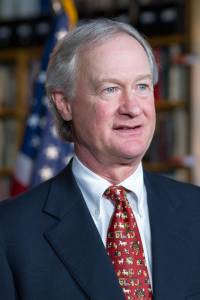 When Lincoln Chafee took the governor’s office in January 2011, the state was in a complete crisis. Municipalities were on the verge of bankruptcy. The pension system was in trouble. And when, during his campaign, he had opposed the passage of the 38 Studios deal, he was blocked from speaking at an EDC meeting and “swatted aside” by a state trooper. He left office as a very unpopular man, with then-Treasurer Gina Raimondo having bad-mouthed him both in the press and during election debates.
When Lincoln Chafee took the governor’s office in January 2011, the state was in a complete crisis. Municipalities were on the verge of bankruptcy. The pension system was in trouble. And when, during his campaign, he had opposed the passage of the 38 Studios deal, he was blocked from speaking at an EDC meeting and “swatted aside” by a state trooper. He left office as a very unpopular man, with then-Treasurer Gina Raimondo having bad-mouthed him both in the press and during election debates.
I was apprehensive, given my very, very vocal opposition to the deal in the campaign, including going uninvited to an EDC board meeting and being barred from entering, that I could be accused of meddling, micromanaging, interfering. There were still board members that were very- had voted in favor of this deal. The executive director and I had sparred in the course of the campaign, now he was my executive director of the EDC. I was very apprehensive about, as I said, micromanaging or meddling in this. I saw my role as to be supportive and write the checks and hope that that first game was successful… We inherited an inferno.
Now comes the release of his deposition. Of all the motley crew of big-shots and political players, he comes across as not just respectable but actually the closest thing to a hero. I do not agree with all of his policy moves while in office, including the public sector pension reform he oversaw, but it is obvious he did not care about his image, he cared about Rhode Island.
-I did get a call from Providence Equity leadership who experience in this area and shared my initial thoughts and opposition and reinforcing that.
-When you say Providence Equity leadership, is there a particular individual you spoke with?
-My classmate, Jonathan Nelson… I had expressed opposition at that point to the loan, and he said I’m in the business, this business, and you’re right about your opposition.
From day one, Chafee was educating himself about the video game industry and saw a turkey. One of the many exhibits in his deposition is a packet of news articles and analyses that he had in his campaign office, representing the level of research he was doing during a busy election season about an industry he and everyone else knew nothing about.
-Yes, these documents we came upon after the request to make sure we had given everything that we had, and just in further searching, these are the documents that reflected that further search.
-Where were they found?
-Some in my campaign office, which was not my original campaign office that I had during the campaign, but a subsequent mini closet, almost, where we store a number of items, and others were in the governor’s office.
-Okay. The mini campaign office you refer to, where is that located?
-Airport Plaza, Warwick, Rhode Island…
-Did you ask any members of your campaign staff to do any research for you into any issues which may concern this type of potential relationship with a company like 38 Studios?
-I’m sure being a team effort and this being a major item in the news and being, you know, a very, very competitive campaign everybody was involved in finding out as much as they could about all the details of this type of state investment.
In both the deposition and public statements, Curt Schilling and his lawyers have tried to blame Chafee for their failures. They claim the governor’s press statements were the kind of bad publicity that drove away potential investors and ultimately caused the company’s failure. In the deposition, Schilling’s lawyer Michael Sarli repeatedly tries to pigeonhole Chafee and make him seem incompetent, a poor chair of the EDC board that was asleep at the wheel. The question, rephrased and repeated time and again, is contemptuous of the Governor’s office, to the point Max Wistow, the lawyer Chafee hired to represent the EDC and launch the current lawsuit, says “The gentleman is the governor. It is being abusive and argumentative.”
Regardless of how one feels about Chafee, every Rhode Islander should understand that Wistow is not standing up just for one man, he is defending the integrity of the state itself, which Schilling is trying to drag through the gutter. Chafee had no ability to impact the company’s success or failure after taking office. What killed 38 Studios was inherent to Schilling’s management style, the nature of the video game industry, and the economic impact of the 2008 crash. They failed to sell enough copies of their first game because it was a mediocre title and people were tightening their belts due to the recession.
GINA RAIMONDO
 The deposition of Gina Raimondo is a one that occupies a unique time and place, having been taken on September 11, 2014, two days after she had won the Democratic primary, but before she won the gubernatorial race and ceased her duties as treasurer. Having emerged from the private sector as a venture capitalist prior to entering politics in 2011, she had a particular level of insight on the issue when news of the 38 Studios deal first broke.
The deposition of Gina Raimondo is a one that occupies a unique time and place, having been taken on September 11, 2014, two days after she had won the Democratic primary, but before she won the gubernatorial race and ceased her duties as treasurer. Having emerged from the private sector as a venture capitalist prior to entering politics in 2011, she had a particular level of insight on the issue when news of the 38 Studios deal first broke.
-Well, as a professional in the field of venture capital, did the idea that the state was looking to enter into some sort of an agreement with 38 Studios pique your professional interest at all?
-Yes.
-Did you do anything in follow-up to having that curiosity?
-I did. I wrote that e-mail to Keith Stokes suggesting that, in my opinion, it was a high-risk venture, and if I could — since I had expertise in investing, if I could be of any help, I was here to help.
Raimondo was in the minority of those who expressed concern about the deal after she talked about the issue with her co-workers, who had a history of financing video game firms and did some research on 38 Studios. Before the company moved to Rhode Island, it was based in an area with a high concentration of gaming developers and the venture capital firms that traditionally finance their efforts.
-Okay. So, at least at the time you had knowledge that there were people that you regarded as experts in the gaming business that had decided not to invest and had looked at 38 Studios specifically, fair?
-Yes. Yes. The nature of the way this happens in general is, you know, Monday morning, you have investment committee meetings. You sit around at a table like this, you say, Sean, what do you think — Sean was my partner, who is a… gaming expert, what do you think of this 38 Studios deal? It’s casual chitchat. And so I don’t remember doing that, but the nature of it, the conversation would have been, in the vernacular it’s called shopped, the deal has been shopped around. I don’t remember him saying it, but I’m thinking reading this, he probably said, oh, that’s been shopped all over the place, and everyone’s passed… I didn’t know anything, really, about the deal or anything other than what I read in the paper, but it’s just the general concept that he was a famous baseball player in a really hot area of gaming in the venture capital mecca of America, and if he couldn’t get venture capital money and had to come to the State of Rhode Island for money, hit the pause button. Like, I didn’t know anything just from the outside looking in, if you’re a famous guy in the hottest area of gaming in the hot venture capital market in the world, and you can’t get funded,… what does the State of Rhode Island know that the whole rest of the world doesn’t know? So it was just a general concept of hold your horses.
It is possible that Raimondo will be able to use quotes like this to her advantage in the future. She is on the public record regarding how she said from the outset that this was a bad deal. But as one reads further on in the transcripts, a troubling image emerges. It becomes absolutely clear that this is a cunning and ruthless politician that will sacrifice anyone to get ahead in a political contest. Consider her treatment of Chafee in May of 2012:
-I’m going to direct your attention to the part of this document that follows the header, “A company doesn’t run out of money overnight.” Do you see that
-Yes.
-And there’s a quote attributed to you in this document and it says… ”To me the much bigger question is what’s been happening over the past 17 months.”… ”General Treasurer Gina Raimondo said in an interview on the Dan Yorke show on Wednesday… “How has the governor and his staff in his capacity as chair of the EDC board been monitoring this investment? A company does not run out of money overnight.”… Would you expect that there would be, on a deal like this, when you talk about monitoring the deal, when you use that word, does that mean that at some point the board of EDC is given information as to how this risky loan is performing?
-I have no idea… I do not know, even as I sit here, how the governance of the EDC, I don’t know the ins and outs of how the governance of the EDC works… I don’t know what information the board is supposed to see, Governor sees, counsel sees, executive director sees, I have no idea.
Ergo, she has no idea what she is talking about but does not mind dragging Chafee through the mud to score a political point. That sort of realpolitik is sadly part and parcel of a political system that traffics in media hype rather than actual ideological standards, treating the contestants as rock stars as opposed to political thinkers. Consider Raimondo’s comments about her own education in law, a point emphasized by her political campaigns.
-Okay. If you recall back to those days at Yale when you were in Evidence class, do you remember past recollection recorded?
-I never took Evidence. Don’t you know they don’t actually teach law at Yale?
-What do they teach, networking?
-Pretty much, yeah.
How encouraging.
Raimondo’s private sector line of work is bitterly referred to as ‘vulture capitalism’ by those who have run afoul of people in her line of work. There are success stories, such as when Facebook went from a college start-up to a multi-million dollar company. But there are thousands of shattered dreams and broken lives also, far more than the successes. She has already set her Wall Street cronies loose on the public sector employee pension system. The fact she even allowed PawSox owner Larry Lucchino to entertain the idea of a taxpayer-financed stadium this summer despite economic analyses forecasting doom shows us this is a person who would not blink an eye while selling out her voters as long as she can curry favors. Carcieri may have been foolish and Chafee swamped, but Raimondo is someone who knows how to get ahead regardless of the consequences as long as she can benefit.
LESSONS LEARNED?
There are lessons to be learned from this mess. It may turn out in all probability that Superior Court Judge Michael Silverstein finds for the defendants and rules that the State was not conned by Schilling, they merely made a very bad financial decision. With the disclosure about Chafee’s friend Mr. Nelson and Raimondo’s warnings from the private sector, it seems clear that there was a reasonable level of insight about Schilling and in fact the politicians just let their egos get ahead of them.
But the type of reform really needed goes well beyond political parties and into the realm of revising our basic norms of government. 38 Studios is not an aberration, it is symptomatic of something deeply embedded in the corruption of Rhode Island’s political culture. The one who was the voice of reason and sanity ended up as a reviled one-term politician, now walking a Quixotic trail towards the Presidential primaries with little support or media hype. The majority of the culprits in this rip-off are going to probably get off scot-free. And the type of people that create these kinds of economic nightmares now have one of their own in power, biding her time and eyeing advancement to Washington DC.
Karl Marx, the prophet who told us capital is a system of contradictions leading towards deeper and wider economic disparity, famously told us “Hegel remarks somewhere that all great world-historic facts and personages appear, so to speak, twice. He forgot to add: the first time as tragedy, the second time as farce.” Unfortunately, the joke is on us.
]]>“I don’t want everyone to vote that’s not well informed on the issues,” said House Minority Whip Joseph Trillo (R- District 24). “So I don’t want to register everybody just because I want bodies to go into a voting booth and vote. You Democrats don’t care about that! You’ll take them by the thousands! As long as they can breathe, walk, take them into the voting booth!”

“An uninformed voter is a manipulated voter,” he added.
Trillo’s concern, as did many others, stemmed from possible voter fraud using an electronic system. The legislation would operate using one’s existing driver’s license or state identification card, which already has their signature on it. Those eligible would be able to register because their signature would already be on file at the DMV, making it easier for them to be verified by the Secretary of State. Their local board of canvassers would then notify them that their registration has been confirmed.
Language in the bill that states that the Secretary of State’s office “may” verify a registrant sparked the debate. Many opponents believed that the Secretary’s office should be required to verify everyone who registers to vote, but those who supported the bill stated that not only is it an undue burden on administration, it is unnecessary because of the cross-referencing done by the board of canvassers. Representative Stephen Ucci (D- District 42), stated that the verification is normally only used to analyze voter trends that may be suspicious.
“You have to look into this in the totality of our voting system,” Ucci said. “Let’s join those other 20 something states that have done this, and get ourselves on the right path to getting people to vote.”
“A person is still required to have a state license or state ID, which you don’t need in person,” Representative Aaron Regunberg (D- District 4), who is the main sponsor of the bill, added. “The system has existed in dozens of states, registering millions of voters, and there has not been a recorded successful incident of fraud.”
Other key points in the debate included accessibility to registration, as well as modernizing Rhode Island’s system. Many spoke about how there are people who do not have the time to go to their town or city hall to register, because they are working during office hours. Going online to vote, rather than paying for an envelope and stamp to mail in registration, is free, making the process more accessible to low-income voters. Putting the process online and making it easier would, in their eyes, serve as an incentive to both register and vote.
Regunberg’s legislation also includes a provision that would enroll Rhode Island in agreements with other states that would allow them to reference data in order to update voter rolls, either registering people who have recently moved into the state, or expunging those who have moved or died.
The bill passed with overwhelming support, in a 63-10 vote. In an interview after the meeting, Regunberg said he was very excited that the legislation passed, especially because it will be one of many solutions to get people out and voting.
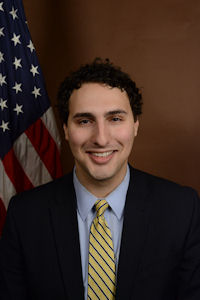
“There’s a whole bunch of things, I think this is one part of it that will absolutely, for a generation of people who are much more used to doing these things online, who don’t really use snail mail, who don’t really understand those more antiquated systems. I think it will make it more accessible. It makes it more convenient for everyone,” he said.
Secretary of State Nellie Gorbea, who helped to craft the bill, provided a statement about its passage as well:
“This legislation will make it easier for citizens to register to vote and update their voter information, and it will improve the accuracy and integrity of Rhode Island’s voter rolls. I thank Speaker Mattiello, the bill’s sponsors, Representatives Regunberg, Handy, Keable, Blazejewski, and Barros; and the entire House of Representatives for their support of this legislation.”
John Marion, the Executive Director of Common Cause RI, was also involved in the bill’s drafting process, and stated that this is a huge step forward for Rhode Island, not only in terms of modernization, but also in terms of system management, and accessibility. As far as systems management is concerned, the electronic process makes everyone’s jobs easier and more cost effective. In some states, the cost per voter has gone down to less than ten cents per registration. But to Marion, those benefits are only secondary.
“The real benefit is to the voters. This is going to allow people easier access to registration, and not just new registrants, but this has a lot to do with people who are moving and don’t want to change their registration,” he said. “Because this is not replacing the current paper based system, it’s a complement to that, it’s going to capture more people, ultimately.”
]]>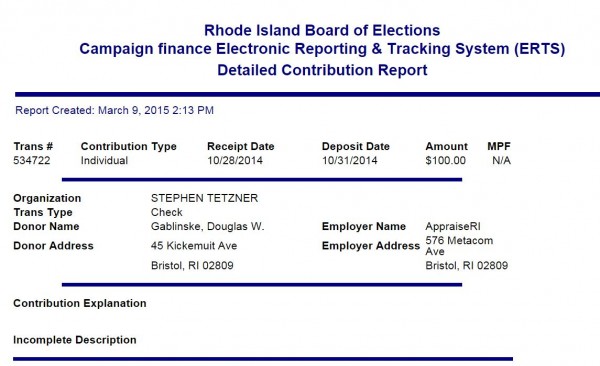
One of the nice things about owning several properties is that when it comes to politics, you have lots of choices about where you can say you live. I’m not talking about the formal definition of legal residence, but “addresses of convenience.”
Having an address of convenience gives you the choice of where to vote or where to run for office. You can shop around to find the most advantageous choice. Not necessarily a legal choice, but one that is rarely ever challenged.
We have lots of examples, such as Republican Kernan “Kerry” King who ran against Gina Raimondo for general treasurer in 2010 even though he was actually a legal resident of Florida and was even collecting a $50,000 a year homestead property tax exemption on his Sarasota County home. He was claiming his Saunderstown house as his legal residence on his campaign declaration.
In my state Representative District (36), we now have a carpetbagger state Representative, a Tea Party Libertarian named Blake Filippi. Filippi claims he lives in his mother’s house on Block Island even though he has listed his mother’s house in Lincoln as his legal address on dozens of legal documents including his Massachusetts lawyer’s license. He told Bob Plain he is currently living in a Providence apartment.
Addresses of convenience. It’s nice to be able to pick and choose. It’s not just Republicans and Libertarians that do it; Democrats also do it.
Take Doug Gablinske, for example. He made a big splash in Rhode Island politics during his two terms in the RI House representing District 68 in Bristol as one of the most vociferous DINOs (Democrat in name only), leading the attack against public workers.
As a result of the 2010 US Census, Gablinske’s district boundaries were changed. In an e-mail to me he said, “I was carefully gerrymandered out of District 68, with the input of Rep. Morrison into the redistricting process, who was afraid I was going to run against him in 2012. The gerrymandering is obvious, as the line moved over one street, to redistrict me out.”
His home at 45 Kickemuit Avenue in Bristol is no longer in District 68, but moved instead to District 69. Gablinske and his wife Patricia moved with the times and changed their voter registration to 44 Greylock Road which is Gablinske’s mother’s house, solidly within District 68 where they have cast their ballots in 2014.
In his e-mail to me, Gablinske asserted that his change in registration had “nothing at all to do with that and everything to do with helping to care for my 86 year old mother, which is where she resides and I own the house with my siblings.”
Despite the change in voter registration, Doug Gablinske kept using his address as 45 Kickemuit Avenue on many campaign contributions he made since re-registering at Greylock Road (example).
There are a dozen major political donations by Gablinske listed in the Board of Elections database for 2014. Gablinske’s residence shows up as Kickemuit on five of those major contributions; his business address on Metacom Avenue is listed on the other seven.
Greylock Road is not listed on any of these donor files.
I asked Gablinske about the checks written from his business address (it is illegal for businesses to make direct donations to Rhode Island political candidates). Gablinske said that he keeps three checkbooks, one for each of these three properties and acknowledged that it would be illegal if he made a donation through his appraisal business.
He added: “For the record, at your request, I reside at both 44 Greylock Road and 45 Kickemuit Avenue and my voter address was changed to 44 Greylock Road, on may May 8th, 2014. My brother Wayne Gablinske, sold his house on Sandra Court, Bristol on February 27, 2015. He has now moved into 44 Greylock Road to care for my mother, so I have returned to 45 Kickemuit Avenue and am changing my voter address back to that address, all of which is perfectly legal.”
Even though he checked his voter registration to Greylock Road in his old district, Gablinske did not make a run to regain his lost House seat in 2012 or 2014, apparently content to run his appraisal business and engage in lobbying. Gablinske said in his e-mail to me, “I have no plans to run for public office…in any district!”
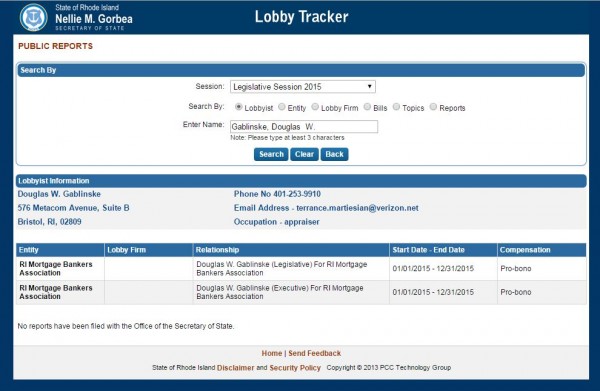 After losing the 2010 Democratic primary, Gablinske started to work with Terrance Martiesian’s lobbying firm, filing reports with the Secretary of State since 2011 that he lobbied the General Assembly on behalf of the RI Mortgage Bankers at no charge.
After losing the 2010 Democratic primary, Gablinske started to work with Terrance Martiesian’s lobbying firm, filing reports with the Secretary of State since 2011 that he lobbied the General Assembly on behalf of the RI Mortgage Bankers at no charge.
Although, on paper, Gablinske is lobbying for the bankers for free, Martiesian’s lobbying firm is billing the RI Mortgage Bankers Association $50,000. What Gablinske gets out of the arrangement does not appear to be covered in the reports to the Secretary of State.
Gablinske asserts that he gets nothing from Martiesian and lobbies for free for the Mortgage Bankers Association because he sits on their board and co-chairs their legislative committee. As an appraiser, Gablinske obviously does a lot of work with mortgage bankers but, he says, “you are trying to connect dots, that do not connect.”
If Gablinske decides the time is right to try to return to the General Assembly since he’s apparently not getting rich from his peculiar lobbying practice, it would be interesting to see which address he uses.
Either address – Kickemuit or Greylock – could be challenged by some sharp-eyed voter based on all the conflicting public records and even Gablinske’s own statement that he lives in both places. But any such challenge would have to be filed very quickly.
After Rep. Donna Walsh learned about Blake Filippi’s declaration of residence and filed a complaint, she was told by BOE Director Bob Kando that under the Board of Election’s rules, there is only a 24-hour window to file a challenge to a candidate’s declaration of candidacy.
While the bizarre way the Board of Elections rules are written gives candidates the edge to get away with running for a seat in a District but not living there, there is the matter of state law and voting.
Under the Rhode Island General Laws, it is a felony to vote or attempt to vote anywhere “other than in the…representative district, or voting district in which the person has his or her ‘residence’”…. Gablinske will have to make up his mind where he really lives before the next time he votes.
One added irony about Gablinske’s flexible residency is that during his time in the State House, he was an outspoken supporter of Rhode Island’s voter ID law.
]]>![Veteran[2]](http://www.rifuture.org/wp-content/uploads/Veteran2-300x198.png) One thing all veterans have in common is their commitment to defend our democracy, namely the right to vote and self-govern. The right to vote defines our nation and the values we project internationally. It is the American brand, our trademark as the shining city on a hill.
One thing all veterans have in common is their commitment to defend our democracy, namely the right to vote and self-govern. The right to vote defines our nation and the values we project internationally. It is the American brand, our trademark as the shining city on a hill.
The importance of these values has been palpable in Afghanistan and Iraq. From 2004 to 2005, my fellow veterans protected Afghani and Iraqi citizens as they chose their elected officials and their future. While the path to those first elections might have been imperfect, the sacrifice of our servicemen and women to protect the process was nothing less than honorable.
If voting is worth the lives of Marines in Iraq, isn’t it worth a day off in the United States of America? I’ll share Veterans Day with Election Day so that every American can make it to the polls. There is no better way to honor our veterans’ service than by voting.
And holding elections on Veterans Day won’t dilute the meaningfulness of the day, On the contrary, it will highlight the Americans who protect our freedom to vote in the first place.
]]> As regular readers of RI Future know Common Cause Rhode Island pushed for a People’s Pledge in the race for governor last year. Despite some skeptics the three leading Democrats agreed to the Pledge in April. Up until the final days the Pledge held and we saw not a single TV or radio ad run by an outside group in the primary. The one violation was quickly dealt with and represented only 1/10,000th of the total spending in the race.
As regular readers of RI Future know Common Cause Rhode Island pushed for a People’s Pledge in the race for governor last year. Despite some skeptics the three leading Democrats agreed to the Pledge in April. Up until the final days the Pledge held and we saw not a single TV or radio ad run by an outside group in the primary. The one violation was quickly dealt with and represented only 1/10,000th of the total spending in the race.
Today we wrote letters to the party nominees and asked them to negotiate another Pledge. While we didn’t literally offer our table again, we stand ready to facilitate a negotiation between the candidates. Last time we called for a Pledge we were armed with evidence from the Scott Brown-Elizabeth Warren U.S. Senate race. Common Cause research showed that the Pledge reduced the amount of negativity, the amount of undisclosed money, and increased the percentage of small dollar donors. Now we have evidence from Rhode Island that the Pledge keeps outside money out of the race. And there is a great survey by Lake Survey Partners showing bi-partisan support for the People’s Pledge.
Let’s hear from the candidates between now and November 4th and insist on a People’s Pledge!
]]>News, Weather and Classifieds for Southern New England
You can also watch the lt. governor’s debate here:
]]>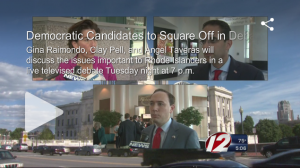
After a summer of spending millions to attack and fact check each other in TV commercials, the three leading Democrats running for governor took the opportunity to do so once more at their last debate before the primary.
“My campaign alone has created more jobs in Rhode Island than Narragansett Beer,” Clay Pell quipped of Gina Raimondo’s pseudo-claim in a TV ad that her venture capital investment in Narragansett Brewery helped create more than 1,000 jobs in Rhode Island.
This was the line of the night. But a close second was when moderator Tim White pushed back about Pell’s talking point about not taking any money from lobbyists or PACs. White pointed out that Pell is independently wealthy and that several high level NEARI employees are volunteering their time for him. Rarely does a debate moderator win applause, but this was a question begging to be asked that was unlikely to be addressed by any candidate.
The big lie of the evening came courtesy of Raimondo when she was accused of standing with Wall Street. She replied, “I’m from Smithfield, I’ve never worked on Wall Street.” Wall Street, of course, in this context, is not a physical address.
Angel Taveras’ watershed moment may have been when he asked the TV camera “would you hire someone who has had nine jobs in eight years?” He spent much of the debate on the attack against both Pell and Raimondo, but did not – notably – dispute Pell’s claim to be the “progressive Democrat” in the race.
The surprise of the evening, for me, was that all three pledged to support the primary winner. It may be a good exercise for all Democrats to spend a few minutes each day until the primary envisioning their preferred candidate campaigning for the others, and vice versa.
]]>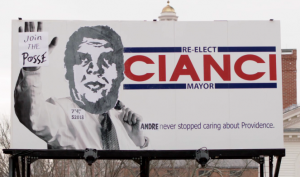 Buddy Cianci, the 73-year-old former mayor can probably think of no better way to go out than dying on a Kennedy Plaza throne and being brought down to Waterfire on a shield. Many people thought they have seen the last of him following five years in prison, but I’m pleased he is eligible to run for office regardless of his criminal history.
Buddy Cianci, the 73-year-old former mayor can probably think of no better way to go out than dying on a Kennedy Plaza throne and being brought down to Waterfire on a shield. Many people thought they have seen the last of him following five years in prison, but I’m pleased he is eligible to run for office regardless of his criminal history.
Buddy’s political career couldn’t be defeated after his first conviction, when some legal and political wrangling got the law bent for him to get back in office. His first conviction was, in some ways, like many others in Rhode Island: a guy loses his temper and gets violent. Whatever the true details, it had nothing to do with his mayoral duties or ability to run the city. Nobody but a Buddy Cianci, surrounded by a political machine, could possibly have gotten reelected for office after being sentenced to five years felony probation in 1984. In fact, a constitutional amendment was passed just a year later- amending the lifetime ban down to one where Cianci would need to wait three years after completing his probation.
In 1990, Cianci’s machine returned to power. A court even ruled that the three-year wait didn’t apply to people convicted prior to 1985. His criminal history, however, did not influence his political views. He didn’t push for new policies that took a rehabilitative approach to social problems. Many mayors do not, and typical to the position the Providence Police served their role in responding to the social dilemmas we still face, i.e. poverty, substance abuse, unemployment, lack of affordable housing, mental illness, and crumbling public education. Arrests lead to convictions lead to lifetimes of de-citizenship for those other than Buddy Cianci.
In 2005, a group of activists in Rhode Island came together to promote a more inclusive democracy and expand voting rights to people on probation and parole. This was especially important as Rhode Island disenfranchised people of color at higher numbers than the Deep South and is a national leader in lengthy probation sentences. Tens of thousands of Rhode Islanders lived and worked in the state, raising children, being good neighbors, yet could not take part in the democracy.
Buddy was not quite yesterday’s news in 2006, when the final proposals were being crafted. He had been indicted in 2001 after “Operation Plunderdome” exposed a classic political kickback scheme. He was amidst his five-year federal prison sentence for racketeering when we drafted the constitutional amendment regarding voting rights – and we considered the right to run for office as well. Based on some people’s well-founded concerns, and the need to avoid a “Buddy” debate, the limitation on running for office was left in place. Back then we just wanted to vote, and none of us wanted to be a politician anyway.
The three-year post-sentence ban ensured that Buddy would be ineligible for the last mayoral race. People expected that to be the end of him. After all, he wouldn’t be eligible for another mayoral run until he was 73. Who even makes it to 73?
The most fundamental aspect of a democracy is the right for a community to choose its own leaders. Eligibility requirements, such as residency for instance, should be limited to things ensuring that a person truly is a representative of the constituency. It may make sense to create policies that bar people with particular criminal histories from being barred from specific occupations. We do this all the time, and it is only the blanket bans that push the bounds of legitimacy and legality (well framed by the EEOC guidelines on employment for people with criminal convictions).
The poetic irony of those up in arms over Buddy’s eligibility is the fact that tens of thousands of Providence residents also have felony convictions. A significant percentage of children in Providence schools have a parent in prison, on probation, parole, or long since moved on from that past. Walk into any business and there is a good chance that someone with a conviction history is working there. They are cooking your food, fixing your vehicle, selling you products, and every other imaginable thing. Buddy did not take up the mantle for the challenges of other folks with conviction histories, thus he is not “representative” in that regard – but at this point we are all so intertwined that, generally, the conviction itself is irrelevant as to one being a good or bad person for the job.
People are free to elect bad leaders. Employers are also free to give people second chances. I confess to having never listened to Buddy Cianci’s radio show since his release from prison, nor have I tried his pasta sauce. He very well may be an out-of-touch old man who would surround himself with cronies, and the children of former cronies. He may paralyze the city, as it expends half its resources trying to be sure he doesn’t corruptly exploit the other half.
The city had over a decade to create a policy that barred people convicted for malfeasance in office for getting that same job back. Look to Cicilline, Lombardi, Taveras, Solomon and the like regarding that issue. It was really that simple and, who knows: perhaps there is still time?
I know first hand that people change. Some change through prison, others just pass adolescence, mourn the passing of a loved one, spend time in quite meditation, or any of the myriad ways we grow as human beings. Some people may not even want a “changed” Buddy as mayor; in fact, they want the same guy back in office. Either way, views on the integrity of every candidate belong in the campaign.
In the end, his eligibility is just like freedom of speech: I may not like what you say, but I’ll defend your right to say it.
]]>
